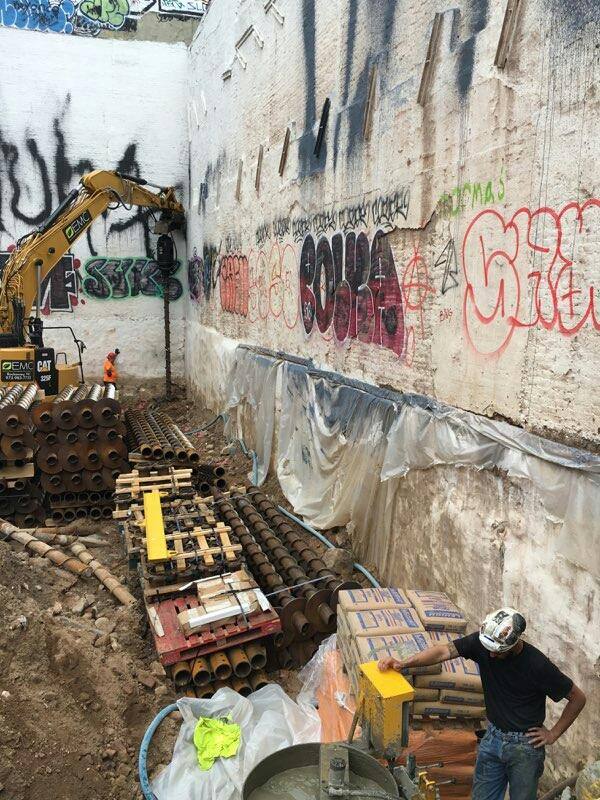Search for topics or resources
Enter your search below and hit enter or click the search icon.
August 3rd, 2018
2 min read

By boring, we mean a soil boring plays a part in this story. What isn’t boring is how the general contractor in this story reduced the pile depth from 80’ to 30’ and in turn, saved over $500,000.00 and shaved 6 weeks off the project schedule by using STELCOR DDM in lieu of a traditional piling method.
OVERVIEW:
Promont, a general contractor, was hired to build a residential building at 86 Delancey Street in New York’s Lower East Side neighborhood. The 12-story poured concrete building was designed by SWA Architecture and will stand across the street from the Tenement Museum and adjacent to a major downtown cross street and underground transit system infrastructure.
CHALLENGES:
Limited access and very limited space for staging materials and performing work were some of the challenges faced on site but the biggest challenge encountered was the soils. Soil borings on the site indicated a risk of liquefaction and a soil class of “E.” This classification mandated that the piles be installed to approximately 80’ to meet the compression and tension load requirements; 120 kips compression (240 ult.) and 60 kips tension (120 ult.)
“The liquefaction concern was not known during the original budgeting and underwriting, so it threw off the entire budget for the job. In addition to the exorbitant costs this would place on the job, the additional work required would also cause significant schedule delays,” said Marty Waisbrod, President of Promont. “In our pursuit of finding a different solution to our problem, Tom Rankin of EMC (Environmental Management Consultants, Inc.), suggested STELCOR, a drilled-in displacement pile, as an alternate deep foundation that would meet our design load criteria without having to go as deep, and in turn, save time on install as well.”
SOLUTION:
The geotechnical team at Dynamic Earth worked closely with the EMC and the IDEAL Design Team, to ascertain if the liquefaction concern could be eliminated. They used in-depth studies which were designed to mimic a real soil response to an actual earthquake and a decision was reached that the soil class could safely be raised to a “D.” Liquefaction was no longer a concern, which allowed for more flexibility as far as what types of deep foundations could be considered.
Tom Rankin of EMC says, “Ideal’s design team provided a pile that could achieve the required loads with a significantly shorter bond length, decreasing the pile depth from 80’ to 30’.” Seeing those numbers gave us “a high level of confidence that our goals of saving time and money could be achieved” said Waisbrod.
Unlike other traditional piling methods, this grouted drilled-in displacement pile option assured there would be minimal disturbance to the adjacent infrastructure. Due to the site’s close proximity to a major NYC Transit (NYCT) subway line, the team met with NYCT to have the grouted pile swiftly approved. EMC then performed on-site tension and compression load tests with a STELCOR SC1600 pile. This pile consists of a 16” grout column with a continuous 5.50” O.D. grout-filled steel core. The pile was tested to 240 kips ultimate in compression and 120 kips ultimate in tension.
Over 15 days, 130 production piles were installed to a depth of 30’ using a custom-built drive tool (see image above) from IDEAL which allowed for the piles to be installed from grade and eliminated the need for any soil cuts. “The interdisciplinary collaboration between the geotechnical specialists, Ideal’s grouted micropile design team, and EMC’s certified installers helped the client ultimately save on both time and money,” said Rankin.
Marty Waisbrod believes that STELCOR saved them approximately 6 weeks total install time and over $500,000.00. “Stelcor provided a very viable solution to a difficult problem, and the install was absolutely flawless. No vibration, no mess, and no obstruction problems. An absolutely outstanding product.” he said.
VIEW/DOWNLOAD LOAD TEST RESULTS
OWNER/DEVELOPER:
David Escava
GENERAL CONTRACTOR:
Promont
http://www.promont.nyc/
INSTALLER:
EMC, Inc.
http://www.emcnj.com/
GEOTECHNICAL ENGINEER:
Dynamic Earth
http://dynamicec.com/
ARCHITECT:
SWA Architects
http://www.swaarch.com/
LOADS:
60 tons compression (design load)
30 tons tension (design load)
SPECIFICATIONS:
5.5” pile shaft
.361 wall thickness 80 ksi
16” tip or drive plate
14” corrugated grout column
9” solid grout column
8” reverse auger
TIME FRAME:
15 days
See how Stelcor Drilled-In Displacement Piles can save you time and money on your next project.